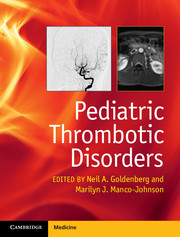Preface
Published online by Cambridge University Press: 18 December 2014
Summary
Over the past few decades, thrombotic disorders have become increasingly recognized as an important problem in pediatrics, affecting neonates through teens and young adults. These thrombotic disorders include both venous and arterial thromboembolism, as well as peripheral vascular, central vascular, cardiac, or cerebrovascular events. Accordingly, their optimal diagnosis and acute and chronic management often requires the ongoing expertise of diverse pediatric specialists, from hematologists to radiologists, emergentologists, intensivists, cardiologists, and neurologists, among others – all of whom can benefit from the collective work of a broad panel of experts brought together to produce this comprehensive text, Pediatric Thrombotic Disorders.
The chapters of this book are designed to provide up-to-date coverage of many of the most salient and topical issues in pediatric thrombotic disorders, including: thrombophilia evaluation, thrombolysis, heparin-induced thrombocytopenia/thrombosis, pulmonary embolism, arterial ischemic stroke, and new antithrombotic agents. In addition, this text contains chapters seldom addressed by other books or special issues devoted to thromboembolism or pediatric hematology/oncology, such as: gastrointestinal and visceral thromboses, infection-associated venous thromboembolism, and severe thrombophilias.
One of our greatest rewards is the opportunity to mentor and teach students, residents, fellows, and junior faculty. Accordingly, we and our coauthor colleagues have striven in this book to develop content that is suitable and of interest across a broad range of readers and “learners,” among which last category we include ourselves. We hope you share our perspective that every chapter in this text offers knowledge and perspectives fromwhich each reader – whether coming from a background of pediatric hematology or another discipline, and whether a medical student or a professor emeritus – may benefit. . . and we welcome your feedback and ideas for improving upon it in future editions.
- Type
- Chapter
- Information
- Pediatric Thrombotic Disorders , pp. ixPublisher: Cambridge University PressPrint publication year: 2015



